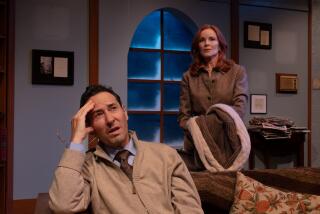A family’s hidden history unfurls in Anne Raeff’s ‘Winter Kept Us Warm’
Anne Raeff’s Flannery O’Connor Short Fiction Award-winning short story collection, “The Jungle Around Us,” included several stories that tracked the family of a single father, Isaac, and his two daughters, Simone and Juliet. In her new novel, “Winter Kept Us Warm,” Raeff returns to these characters, but instead of moving forward into Simone and Juliet’s lives as adults, as she began to do in the collection, Raeff gives us the girls’ history, complete with how Isaac became their father.
The book opens with a frame narrative, taking place in the early aughts: Isaac, a man in his late 70s or early 80s, arrives at Hotel Atlas in Meknes, Morocco. He’s exhausted by his journey, a flight from New Jersey and the strict post-9/11 TSA guidelines, followed by a long train ride from Rabat, on which he was forced to stand amid smokers and had to contend with his asthmatic lungs. But when he arrives at the hotel, he is lighted up and energized by Ulli, who is the owner of the hotel, and the woman he has come all this way to see.
It’s been almost 40 years since Isaac and Ulli have seen one another, a distance of time that Raeff manages to render both significant and meaningless in tiny moments such as when Isaac tells Ulli she looks the same, “though this was neither true nor what he had wanted to say. She looked like Ulli, but she was old now.” From here, the book rewinds, and moves back and forth between this framing narrative of Isaac’s visit to Morocco and the history he and Ulli share.
This history is at the heart of the narrative, with the missing 40 years between Isaac and Ulli serving as the puzzle the book is going to solve. In order to do so, though, we need to learn about Leo, a closeted gay man whom Isaac met in the U.S. Army when they were both working desk jobs during World War II, Isaac because of his asthma and Leo due to a heart condition discovered only when he tried to enlist. It soon becomes apparent that Leo and Ulli are the biological parents of Simone and Juliet, Isaac’s daughters.
The characters’ back stories unfold in Raeff’s deft prose, revealing three unique people whose lives crash together unexpectedly. Ulli, who is German, was too absorbed with an illicit romance with her high school math teacher in the years before the war, and in hindsight is grateful because it meant the Nazi fanaticism passed her by. Leo comes from Johnstown, Penn., where a decades-old flood still haunts the local imagination. And Isaac, whose silent yearning for Ulli is the novel’s emotional backbone, is the son of Russian parents who moved to New York when he was still young. The three meet in post-World War II Germany, where Leo and Isaac are working their desk jobs in Berlin’s American Zone, and where Ulli is plying her linguistic skills by going around to bars and offering to translate for American men trying to sleep with German women. She’s also living in an apartment not her own, one of those emptied when people fled the city during the worst of the Allies’ bombings.
Almost as soon as their paths cross, they become inseparable, with Isaac and Leo basically moving in with Ulli. As Leo and Ulli’s romance grows, Isaac gets left by the sidelines, watching, a part of him waiting for the day it’ll all fall apart. And, of course, we know from the start that things will collapse, because Leo isn’t part of the frame narrative.
This is a novel about absence — the absence of those most harmed by the war; the emotional absence felt inside relationships, romantic or otherwise.
In many ways, this is a novel about absence — the absence of those most harmed by the war; the emotional absence felt inside relationships, romantic or otherwise; and the absence of Simone and Juliet from the narrative, which in turn points to the absence of their parents from their lives. It is about the choices people slide into almost by accident that end up shaping their lives, and how this becomes clear only with the wisdom of hindsight. This kind of drama is quiet and subtle, but Raeff knows how to wield her words in this space, and makes small pronouncements devastating — as, for example, in the frame narrative, when Ulli simply can’t take Isaac’s presence anymore and pulls away from him:
“Don’t be sorry, just don’t do it, Isaac thought. It was what he used to tell the girls when they apologized about something they had done, though he knew they would make the same mistakes again and be sorry again. ‘Ulli,’ he called, but she was already gone.”
Indeed, one of the most remarkable things about the novel is how quiet it is, and how much respectful space Raeff allows her characters. While their inner thoughts and feelings are sometimes conveyed in a sentence or two, as above, Raeff largely documents these without dwelling there. This isn’t a book obsessed with its people’s thoughts, and there are no long paragraphs of internal monologues. Instead, these characters are in the thick of their lives, and Raeff shows us their fullness in quick sketches, the way a skilled artist may convey movement and attitude with only a few penciled lines.
Masad is a writer, critic and PhD candidate at University of Nebraska-Lincoln.
Anne Raeff
Counterpoint: 304 pp., $26
More to Read
Sign up for our Book Club newsletter
Get the latest news, events and more from the Los Angeles Times Book Club, and help us get L.A. reading and talking.
You may occasionally receive promotional content from the Los Angeles Times.







